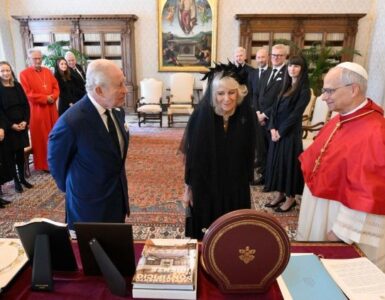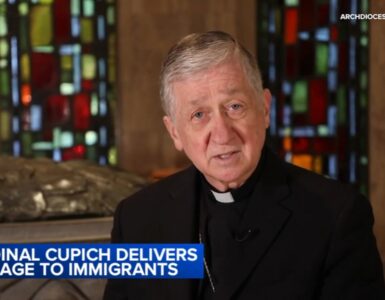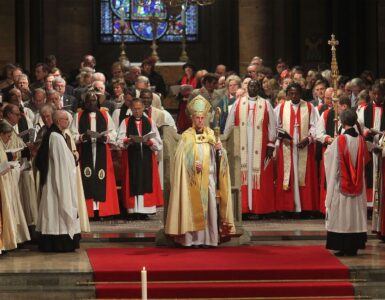By Thomas Colsy
Editor’s note: The following is a review of some of the aspects of Pope Leo’s first interview. For a more complete analysis of the interview in its totality, see this video
Pope Leo XIV’s first extended interview, given to Elise Ann Allen of Crux Now and later included in a biographical volume, offers a telling portrait of his papal style. His words have drawn criticism across the Catholic world for their omissions and potential implications. In particular, traditionalists see cause for concern in the Pope’s opinions about the immutability of Catholic doctrine.
Leo has so far shown himself less antagonistic and less radical than his predecessor. Yet he maintains a familiar rhetorical method: diplomatically ambiguous phrasing that leaves every side half-satisfied, inclusivity emphasized so as to appear sympathetic to positions and movements the Church cannot endorse, and an avoidance of definitive statements except when repeating the letter of doctrine.
Joseph Shaw, reflecting on Fiducia Supplicans in 2023, remarked that “the best way to understand it is to see it as part of a strategy to make the greatest possible liberal-friendly publicity splash with the smallest-possible disciplinary or doctrinal concession.” Some of Leo XIV’s recent language can be understood in the same way. The emphasis is on openness and respect, producing headlines that do not antagonize progressives, while doctrinal substance remains formally untouched. The result is a carefully modulated ambiguity: pastoral in tone, cautious in doctrine, yet disquieting because it appears to leave open the possibility of change where none is possible.
A prime example was his treatment of sexual morality. Asked about “LGBTQ+ issues,” Leo said: “People want the Church doctrine to change, want attitudes to change. I think we have to change attitudes before we ever change doctrine.” Charitably read, this stresses the need to form hearts before rules can be received. Yet it also risks implying that doctrine itself could evolve if public sentiment shifts — which has drawn fire from orthodox Catholics.
Instead of stating clearly that homosexual acts and all sexual relations outside marriage are intrinsically sinful and can never be sanctioned, Leo offered only: “I find it highly unlikely, certainly in the immediate future, that the Church’s doctrine in terms of what the Church teaches about sexuality, what the Church teaches about marriage [will change],” and concluded, “I think that the Church’s teaching will continue as it is, and that’s what I have to say about that for right now.”
The pastoral caution is obvious, but the phrasing certainly raises potential cause for concern. Catholic teaching on sexual morality is not a matter of likelihood or timelines. It is definitive, rooted in natural law and divine revelation, and incapable of alteration. Christ Himself promised Peter and his successors the charism of the Spirit not so they might invent new doctrine, but so that they might “religiously guard and faithfully expound the revelation or deposit of faith transmitted by the apostles” (Vatican I, Pastor Aeternus). Pius IX condemned the idea that revelation is “imperfect and therefore subject to a continual and indefinite progress.” Pius X required clergy to swear that dogma is handed down “in exactly the same meaning and always in the same purport.” Against this backdrop, to describe doctrine in terms of probability rather than impossibility risks misleading the faithful, even if it is only a matter of emphasis.
A similar dynamic appeared in his remarks on women and the diaconate. “What the synod had spoken about specifically was the ordination, perhaps, of women deacons, which has been a question that’s been studied for many years now. I am certainly willing to continue to listen to people,” he said. He added that the permanent diaconate itself “is not yet properly understood and properly developed,” before clarifying: “I at the moment don’t have an intention of changing the teaching of the Church on the topic.”
Once again, the doctrine remains intact, but the emphasis suggests openness. The historical reality is clear: the “deaconesses” of antiquity were not sacramentally ordained. Holy Orders in every degree are reserved to men. To present the issue as unresolved risks, creating the impression that change is conceivable, even though the Church has repeatedly affirmed it is not.
The same rhetorical method surfaced in other areas. On the Traditional Latin Mass, Leo called the matter “very complicated” and “a political tool.” While denouncing polarization, he did not specify whether his concern lay chiefly with the Mass’s advocates or its opponents. On synodality, he described it as “an attitude, an openness, a willingness to understand,” while cautioning against turning the Church into a parliamentary democracy. On the blessings of same-sex couples in Northern Europe, he criticized them not as contrary to Catholic doctrine but simply as exceeding the limits of Fiducia Supplicans — appealing to Francis’s authority rather than the consistent moral teaching of the Church.
In all these cases, doctrine has not changed. Marriage remains between one man and one woman; Holy Orders remains reserved to men; the Tridentine Mass remains permitted under delineated conditions, while the Mass of Paul VI is normative. Yet the way these truths are expressed suggests compassion toward those who desire change. It is a strategy that keeps those who wish to remake the Church in a liberal image engaged, while reassuring those who look for fidelity to her perennial teachings.
The interpretive key to these positions may lie in one line Leo emphasized more than once: “I’m trying not to continue to polarize [or] promote polarisation in the Church.” There were moments when he appeared visibly cautious in tone, especially on sensitive issues. Traditionalists might reasonably protest, as Fr. John McFarland of the SSPX once put it, that it is much easier to simply say what you mean clearly than to rely on carefully crafted vagueness. Yet some context is needed.
Much of what any modern pope says is ghostwritten or filtered through advisers. Francis often went off-script, to the frustration of journalists and the Vatican bureaucracy alike. And Leo’s interview with Allen did not appear scripted, which may partially explain his cautious answers. Furthermore, whether rightly or wrongly, factions exist around the papacy, and they exert influence. Benedict XVI himself asked for prayers that he “may not flee for fear of the wolves.” He did not name them, but the faithful have long speculated about hostile forces within the Vatican. John Paul I suddenly died under suspicious circumstances just a month into his pontificate. And today, leaders of the German Church threaten open schism. Against this background, Leo’s studied caution may be less a personal failing than a survival strategy, designed to keep radicals placated while preventing outright rebellion or rupture.
It is also true that clarity cuts both ways. While Leo has not distanced himself from LGBT advocate Fr. James Martin, who claims papal support, neither has he declared opposition to Catholic teaching. He has not declared hostility to the Traditional Latin Mass (as influential liberal cardinals who surround him would have hoped), but nor has he embraced it. He appears to prefer a holding pattern: saying and doing little that would provoke revolt.
Beyond these flashpoints, Leo has spoken with greater clarity. He said plainly that his role is not to resolve world crises but to proclaim the Gospel: “I don’t see my primary role as trying to be the solver of the world’s problems… although I think that the Church has a voice, a message that needs to continue to be preached, to be spoken and spoken loudly.” He lamented the “silo mentality” of the Curia, promised balance in handling abuse cases, and reaffirmed his conviction in Jesus Christ: “I believe very strongly in Jesus Christ and believe that that’s my priority, because I’m the bishop of Rome and successor of Peter.” Here his language was more typical of what we’d expect from a typically solid reigning pontiff.
Yet it is in contested areas that the note of ambiguity returns. Leo has not crossed doctrinal lines, but his strategy of generosity in tone and caution in substance blurs the line between what is open to discussion and what is divinely fixed. This is a form of ecclesial diplomacy: the papacy as mediator between factions. But diplomacy has risks. It can obscure immovable truths, leaving the faithful unsure what is negotiable and what is not.
The instinct to be conciliatory is understandable. But as Newman wrote, “ten thousand difficulties do not make one doubt.” Even a hint of doubt, especially from a pope, unsettles confidence. The faithful deserve clarity on truths that cannot change. Ambiguity may cool tempers, but it cannot substitute for certainty. Only the truth, after all, sets souls free.
Leo XIV has so far chosen sympathy over firmness, emphasis over definition. He remains within the bounds of Catholic faith, yet his words occasionally give the impression that those bounds are elastic. There is real danger in a rhetorical method that implies possibilities foreclosed by the nature of dogma. The pope’s duty is to feed his flock with truth, not to leave them guessing.
Until such implications are dispelled, the early hallmark of this pontificate will remain: generosity of style, caution in doctrine, and the impression — more troubling than any outright denial — that what cannot change might still be up for debate. Leo has suggested he will listen to Traditional Latin Mass advocates, likely at the upcoming Summorum Pontificum pilgrimage in Rome. It is vital that traditional Catholics show themselves charitable, loyal, peaceable, good faith actors in these encounters.
Figures such as Fr. Charles Murr have declared they will no longer extend to Leo the “benefit of the doubt” they once gave Francis. That stance is understandable, though perhaps premature.
Time will reveal the real shape of this papacy. The smokescreen of ambiguity will not last forever. When the mist clears, Leo’s definitive positions will be made manifest — to the ire of some and the elation of others. As this jubilee year nears its end: is the Leonine honeymoon also drawing to a close?




